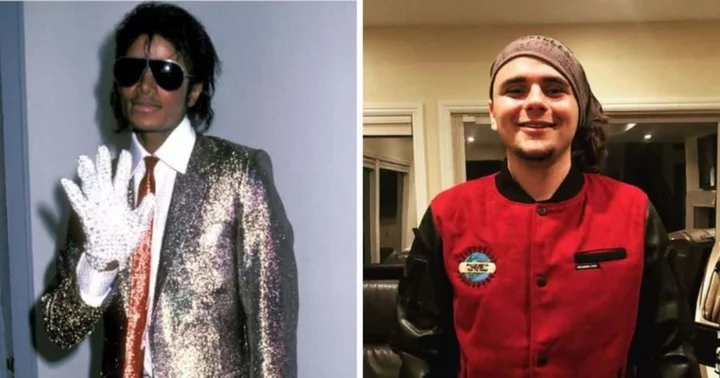LOS ANGELES, CALIFORNIA: Prince Jackson, the eldest son of Michael Jackson, spoke about his father's struggle with vitiligo when he appeared on the podcast 'Hotboxing' with Mike Tyson.
The condition occurs when pigment-producing cells (melanocytes) die or stop producing melanin — causing patches of skin to become lighter or white. This auto-immune disorder can be set off due to genetic mutation, stress, and environmental triggers.
"I think it was even in the autopsy report. I think the cause of it is up for speculation, but it’s either vitiligo or some form of lupus contributed to the vitiligo," Prince revealed.
The condition had shattered the towering confidence of the King of Pop who died in 2009, his son divulged.
“When I was younger, he was always explaining to me, speaking about that," Prince told Mike.
The condition caused his father anxiety, shared Prince, "He had a lot of insecurity around, kind of looking blotchy in his appearance. So he wanted to see if he could smooth out his appearance, to help with his security on his physical appearance.”
What did Michael Jackson say about his vitiligo?
In an interview with Oprah Winfrey in 1993, Michael Jackson had himself spoken about his condition. "I have a skin disorder. The pigmentation of my skin, it is something I cannot help,” he stated at the time.
“When people make up stories that I don't want to be who I am, it hurts me. It's a problem for me. I can't control it. But what about all the millions of people who sit in the sun to become darker, to become other than what they are? Nobody says nothing about that," he countered.
In the 1990s, speculations were rife that the singer was trying to change the color of his skin because of extensive cosmetic surgery and his changing appearance.
Is vitiligo hereditary?
Researchers are still looking into the factors responsible for this disorder, but studies have shown about 30% of vitiligo cases to be genetic. This means that it is a hereditary disorder and may run in the family.
However, the inheritance pattern of vitiligo is complex, since there are multiple causative factors at play. One in five people having vitiligo has atleast one close relative with the same condition.
What are the treatments for vitiligo?
Vitiligo is a cosmetic condition and it's treatment is not an absolute necessity. However, for the condition is widespread and affects your mental well-being, there are a number of treatment options to choose from, such as following:
Medications: Certain drugs like corticosteroids, ruxolitinib and calcineurin inhibitors can slow the rate of pigmentation loss and help melanocytes to regrow to bring back the color of the skin.
Light Therapy: Light boxes, UV B light or medical grade lasers are directed at the skin for short periods of time to help return color to the skin. For treatment of large areas of skin with vitiligo, oral psoralen medication and PUVA treatments are combined.
Depigmentation Therapy: Monobenzone is used to remove the natural skin tone to match with the areas of skin affected with vitiligo.
Surgery: Surgical treatments for vitiligo include skin grafting and graft blistering.

